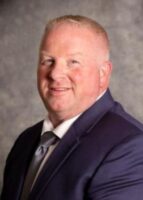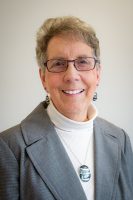This story is part of a series of candidate profiles that Idaho Education News will publish leading up to the Nov. 5 general election. Our coverage focuses on competitive races in swing districts and those that have implications for education policy. Click here to see your ballot. Click here to check out EdNews’ voter guide to the 2024 general election races.
Rep. Brandon Mitchell faces retired science educator Kathy Dawes in his run for a third term.
The two agree that schools need more funds to replace and repair facilities but differ on private school choice.
A local business owner, Mitchell wants K-12 education to “get back to the basics.” He supported the school facilities funding bill last legislative session but said he wants to do more for the schools in his district that sorely need more funds for repairs and upkeep.
Dawes, a retired science educator, argues the Legislature continues to woefully underfund Idaho schools, especially when it comes to facilities, instead forcing districts to rely on levying local property taxes. That impact is amplified in rural areas, she argued.
Dawes has far out-fundraised Mitchell at nearly $77,000 compared to his almost $34,000.
District 6 takes in all of Latah and Lewis counties and a section of Nez Perce County.
Mitchell on the issues
Mitchell, 54, was initially elected to the House in 2021. He and his wife moved to Moscow in 2012 and own six Jiffy Lube locations in the area.
He said he decided to run again to continue the success he’s had in his first two terms.

“I’ve learned how to create relationships with other legislators,” Mitchell said.
He has co-sponsored 23 bills, 21 of which have passed. Most of those ideas have come from constituents in his district, Mitchell said, something he hopes continues if re-elected.
When it comes to education, Mitchell wants schools to return to a focus on core subjects like reading, writing, and math.
“We’ve got to get our schools back to the basics,” he said.
While Mitchell voted for House Bill 521 that was designed to provide facilities funding to local school districts, he believes the bill was flawed and needs to be adjusted.
Moscow School District received less than $8.5 million which is not enough to fix existing schools, let alone build a new school, Mitchell said.
He wants inspectors to go out and rank which schools need repairs the most and then for the state to distribute funding based on the inspector’s findings, Mitchell said.
He also supports “cookie-cutter schools,” with the state having small, medium, and large school plans that districts could adjust based on their land and needs.
Mitchell is tentatively supportive of some kind of private school choice plan that would provide families with funds to put toward private education or homeschooling, depending on what is proposed this legislative session. He’s not a fan of the voucher system, he noted.
He noted that his youngest daughter was homeschooled and attended both charter and public schools. In part because of that experience, Mitchell said he knows how important it is that parents have a right to choose the best educational option for their child.
Many detractors of private school choice programs argue it provides public funds for private schooling with no accountability, like test scores or graduation rates.
“I’m not real worried about that side of things,” Mitchell said. “I think that a lot of times when the parent is involved the parent has a good pulse on what’s involved as far as education goes.”
Mitchell supports state funding for higher education, despite calls from a faction of the Republican party to defund higher education, but doesn’t support new programs and wants to make sure that current funding is getting to students, not being tied up paying for administration.
He has also pushed for more seats in the WWAMI program, the University of Washington School of Medicine’s multi-state program that encourages graduates to practice in primary care and family medicine in rural areas, to address Idaho’s physician shortage. He hopes to continue pushing for more Idaho spots in the program if re-elected.
Dawes on the issues

A retired middle school science teacher, Dawes, 76, said the lack of resources for K-12 schools is one of the main reasons she is running for office.
“As a former educator I am very concerned about public school funding, including facilities,” Dawes said. “I am very disappointed that the legislature has not taken seriously its duty to fund public education properly.”
She argued the years-long legal battle, resulting in more than a handful of arguments before the state’s Supreme Court dating back to the 1990s, has still not resulted in adequate funding to schools, especially when it comes to facilities. Instead, communities still rely on levying property taxes to fill the gap left by a lack of state support, she said.
Dawes moved to Moscow in 1973 with her husband, Dana, to finish her masters degree in zoology at the University of Idaho. She went on to teach eighth grade science in the Moscow School District.
When she started teaching, Dawes remembers how “fortunate” she felt to have a recently renovated lab space at what was then the junior high school.
“It made all the difference in the world,” Dawes said, noting the funds for the renovation came from local property taxes.
She went on to become an Americorps volunteer and put together science activities, which she toured to rural schools with the help of a grant.
“It was amazing the lack of facilities in rural schools,” Dawes said. “And how excited the kids were to do hands-on science.”
Dawes said HB 521 “definitely did not go far enough” in providing school facilities funds.
The funds provided by the bill will roll out over the course of a decade. Dawes says by the time all of the funds are provided, schools will need new and different repairs.
“I worry for the school districts that have to spend time developing a plan to fit the requirements of the bill, especially in the rural communities where its’ going to be the superintendent or the principal doing this work,” Dawes said. “They already have enough to do.”
Dawes opposes any program or plan to provide public funds to families for use in private education.
“First of all all of these are being done in the name of school choice and I believe that’s a total misnomer,” Dawes said. “We already have plenty of school choice. We already have public schools, charter schools, magnet schools, online schooling, homeschooling and private schools.”
Any funds diverted to private education will take away from public schools, Dawes said, noting the ballooning cost of Arizona’s school voucher program that led to the state facing a $1.4 billion budget shortfall.
Private schools aren’t held accountable at the same level as public schools, Dawes argued without testing requirements and the ability to reject students.
“There’s no transparency,” Dawes said, noting private schools don’t post their budgets. “We’ll never know how they actually spent the money.”
While Dawes admits she doesn’t have a “perfect answer” for where the money should come from to move more funds to upgrade K-12 school facilities, she has some ideas on where to start looking, like tightening up sales tax exemptions.
Dawes unequivocally supports the state continuing to fund higher education.
“It’s incredible and it’s a bargain,” Dawes said of the University of Idaho, where she is an alumni. “But it would not be without state funding.”
Dawes said she’s a better fit for her district than returning Mitchell to the house after he voted multiple times for state control over local boards in what Dawes called opposition to the Republican Party’s stated belief that “the most effective, responsible, responsive government is government closest to the people,” quoting from the party’s most recent platform.
“And yet he voted on bills that would tell our library boards what to do, our school boards what to do,” Dawes said. “These are locally elected officials that care for our community and should not be told by the state what to do.”
Dawes raised concerns that out-of-state interests and PACs are sending mailers and push polls in support of Mitchell.
“I’m upset about the fact that Idahoans are being deceived by mailings and polls coming from outside the state,” Dawes said. “Pushing their agenda and pushing a specific candidate.”
She pointed to three mailers sent by the American Federation for Children, a Texas-based group that advocates for private school choice, in support of Mitchell and a poll by JMC Analytics and Polling that appeared in recent months.
Dawes noted she is not accusing Mitchell of being involved in the mailers or poll and said Mitchell called her to clarify he had nothing to do with the mailers.
Mitchell’s campaign manager told the Moscow Pullman Daily News that he was not aware of the poll before it was sent out and did not authorize it.
